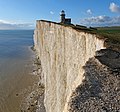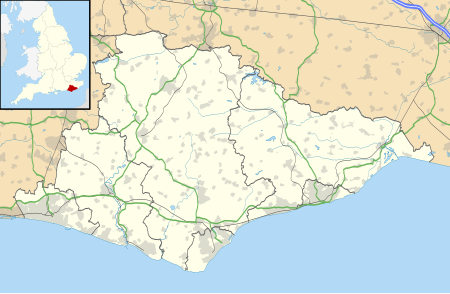Portal:East Sussex

East Sussex is a ceremonial county in South East England. It is bordered by Kent to the north-east, West Sussex to the west, Surrey to the north-west, and the English Channel to the south. The largest settlement is the city of Brighton and Hove, and the county town is Lewes.
The county has an area of 1,792 km2 (692 sq mi) and a population of 822,947. The latter is largely concentrated along the coast, where the largest settlements are located: Brighton and Hove (277,105), Eastbourne (99,180), and Hastings (91,490). The centre and north of the county are largely rural, and the largest settlement is Crowborough (21,990). For local government purposes, East Sussex comprises a non-metropolitan county, with five districts, and the unitary authority of Brighton and Hove. East Sussex and West Sussex historically formed a single county, Sussex.
East Sussex is part of the historic county of Sussex, which has its roots in the ancient kingdom of the South Saxons, who established themselves there in the 5th century AD, after the departure of the Romans. Archaeological remains are plentiful, especially in the upland areas. The area's position on the coast has also meant that there were many invaders, including the Romans and later the Normans, following the defeat of the English army by William the Conquerer at the Battle of Hastings in 1066. Earlier industries included fishing, iron-making, and the wool trade, all of which have declined or been lost completely. (Full article...)
Selected article
Pevensey Castle is a medieval castle and former Roman Saxon Shore fort at Pevensey in the English county of East Sussex. The site is a scheduled monument in the care of English Heritage and is open to visitors. Built around 290 AD and known to the Romans as Anderitum, the fort appears to have been the base for a fleet called the Classis Anderidaensis. The reasons for its construction are unclear; long thought to have been part of a Roman defensive system to guard the British and Gallic coasts against Saxon pirates, it has more recently been suggested that Anderitum and the other Saxon Shore forts were built by a usurper in an ultimately unsuccessful attempt to prevent Rome from reimposing its control over Britain.
Anderitum fell into ruin following the end of the Roman occupation but was reoccupied in 1066 by the Normans, for whom it became a key strategic bulwark. A stone keep and fortification was built within the Roman walls and faced several sieges. Although its garrison was twice starved into surrender, it was never successfully stormed. The castle was occupied more or less continuously until the 16th century, apart from a possible break in the early 13th century when it was slighted during the First Barons' War. It had been abandoned again by the late 16th century and remained a crumbling, partly overgrown ruin until it was acquired by the state in 1925.
Pevensey Castle was reoccupied between 1940 and 1945, during the Second World War, when it was garrisoned by units from the Home Guard, the British and Canadian armies and the United States Army Air Corps. Machine-gun posts were built into the Roman and medieval walls to control the flat land around Pevensey and guard against the threat of a German invasion. They were left in place after the war and can still be seen today. Pevensey is one of many Norman castles built around the south of England. (Full article...)
Selected images
Selected biography
Norman Quentin Cook (born Quentin Leo Cook, 31 July 1963), also known by his stage name Fatboy Slim (among others), is an English musician, DJ, and record producer who helped to popularise the big beat genre in the 1990s. In the 1980s, Cook was the bassist for the Hull-based indie rock band the Housemartins, who achieved a UK number-one single with their a cappella cover of "Caravan of Love". After the Housemartins split up, Cook formed the electronic band Beats International in Brighton, who produced the number-one single "Dub Be Good to Me". He then played in Freak Power, Pizzaman, and the Mighty Dub Katz with moderate success.
In 1996, Cook adopted the name Fatboy Slim and released Better Living Through Chemistry to critical acclaim. Follow-up albums You've Come a Long Way, Baby, Halfway Between the Gutter and the Stars, and Palookaville, as well as singles such as "The Rockafeller Skank", "Praise You", "Right Here, Right Now", "Weapon of Choice", and "Wonderful Night", achieved commercial and critical success. In 2008, Cook formed the Brighton Port Authority, a collaborative effort with a number of other established artists including David Byrne. He has been responsible for successful remixes for Cornershop, the Beastie Boys, A Tribe Called Quest, Groove Armada, and Wildchild.
It was reported in 2008 that Cook held the Guinness World Record for most top-40 hits under different names. As a solo act, he has won a Grammy Award, nine MTV Video Music Awards and two Brit Awards, and was nominated for the Tony Award for Best Original Score in 2024. (Full article...)
Did you know that
General images -
List articles

- List of hills of East Sussex
- List of local nature reserves in East Sussex
- List of monastic houses in East Sussex
- List of museums in East Sussex
- List of Parliamentary constituencies in East Sussex
- List of places in East Sussex
- List of settlements in East Sussex by population
- List of Sites of Special Scientific Interest in East Sussex
- List of windmills in East Sussex
Subcategories
Settlements map
Things you can do
- Add to this portal.
- Join the Sussex WikiProject
Topics
Related portals
Associated Wikimedia
The following Wikimedia Foundation sister projects provide more on this subject:
-
Commons
Free media repository -
Wikibooks
Free textbooks and manuals -
Wikidata
Free knowledge base -
Wikinews
Free-content news -
Wikiquote
Collection of quotations -
Wikisource
Free-content library -
Wikiversity
Free learning tools -
Wikivoyage
Free travel guide -
Wiktionary
Dictionary and thesaurus


























































































